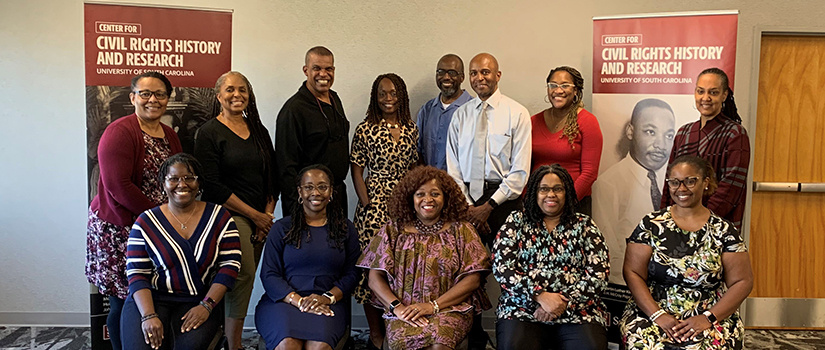Black Faculty Caucus Statement of Principle on University of South Carolina Community Engagement
October 5, 2020
The University of South Carolina (USC) is one of only a very few state university
flagship campuses located in the heart of a midsize or large urban area. With that
good fortune comes a special obligation to be a good neighbor, a community partner,
and a force for social good. Like many colleges and universities, USC has not always
lived up to that obligation but opportunities to do better are ever-present.
Therefore, we, the members of the USC’s Black Faculty Caucus, urge the university to commit itself to being a good neighbor to those neighborhoods that immediately surround the campus proper, and to being a force for social good here in the Midlands and throughout the state.
As members of the USC faculty, the Black Faculty Caucus commits itself to the same on the basis of these three enduring principles.
-
A recognition of past harms. The land that Richland County and the University of South Carolina sits on was originally occupied by the people of the Congaree and Santee. Many of the structures that currently stand on the historic Horseshoe were built and maintained by enslaved labor. More recently, the USC has had a problematic history of campus expansion that includes substantial displacement of people in once predominantly African American neighborhoods nearby, like Booker T. Washington, Ward One, and Wheeler Hill.
-
A holistic consideration of problems. The USC must think holistically about re-examining its history of past harms to Indigenous, African American, and other marginalized people. Such a re-examination may at moments call for meaningful symbolic gestures, including renaming buildings and other sites, but it must also include other more concrete efforts to repair harm.
-
A commitment to restorative justice. Undergirding any efforts to a holistic consideration of problems must be a commitment to restorative justice. Its grounding principle is to reduce and repair harm, and any such effort must include all parties who have been subject to harm. A commitment to restorative justice should apply to university expansion and its relationships to law enforcement, business partners (e.g., student housing developers), suppliers and vendors, etc.
Statement Regarding the Racist Vandalism at USC
April 24, 2020
An event sponsored by the Association of African American Students (AAAS) at the University
of South Carolina, held on the web conferencing platform Zoom, was interrupted by
a person or persons displaying racist language and imagery on the evening of April
24th. AAAS has released a statement confirming the incident.
We, the members of the Black Faculty Caucus at the University of South Carolina, stand in solidarity with the AAAS. Further, we stand at the ready to lend whatever support we can at this sensitive time. We thank President Caslen for quickly acknowledging the incident and notifying the University community of the steps his office has taken, in consultation with the Division of Information Technology, to investigate it. Given the rapid transition to digital technology that the University of South Carolina has had to undergo, its ongoing efforts to keep online workspaces and gathering places free of harassment are much appreciated.
Nevertheless, we note that it would be misleading to view the April 24th incident exclusively through the lens of online or campus security. This is the latest salvo in an ongoing campaign of racist and xenophobic displays that have become all too familiar in public life, including on college campuses. Security measures have a role to play in ridding our community of such displays, but they cannot play the leading role. Rather, our shared commitment to uphold the principles outlined in the Carolinian Creed, grounded in an ethic of “as are you, so am I,” must play the leading role in making this campus wholly unwelcoming to racism and xenophobia.
On April 24th AAAS was showing us just how to uphold such a commitment, providing mutual aid and support through difficult times. Our fondest hope as a caucus is that we follow their example and continue to stand in solidarity with them.
January 18, 2018
The USC Black Faculty Caucus condemns in the strongest possible terms the recent defacement
of public spaces on campus, including an African American Studies Program display,
as first reported in the Daily Gamecock on January 16, 2018. This act of vandalism
joins a lengthy list of similar incidents reported on college campuses (and even high
schools) across the country in recent years. This kind of racist invective directly
undermines our Carolinian Creed by using misinformation and gross stereotypes to sow
discord. In response, we call on all members of the USC community to uphold the Creed
by supporting Black students, faculty, and staff, and we call on our University’s
leadership to continue to strengthen its commitment to diversity and inclusion.
About the Black Faculty Caucus
Established in April of 2014, the Black Faculty Caucus (BFC) of the University of South Carolina exists to promote a strong sense of community, professional welfare, development and advocacy for Black faculty and the issues that concern and affect them.
We strive to address quality of life issues specific to Black faculty and provide opportunities to improve the social wellbeing of faculty, both within and outside of the university community. We also facilitate the professional welfare and development of Black faculty members through mentoring, cooperative research and other programs that are focused on improving the rate of faculty who obtain tenure, are promoted and are otherwise retained as faculty members at the University of South Carolina.
For more information about the Black Faculty Caucus, please refer to our Bylaws [pdf] or contact Dr. Gloria Boutte, BFC chairperson by emailing gsboutte@mailbox.sc.edu.
